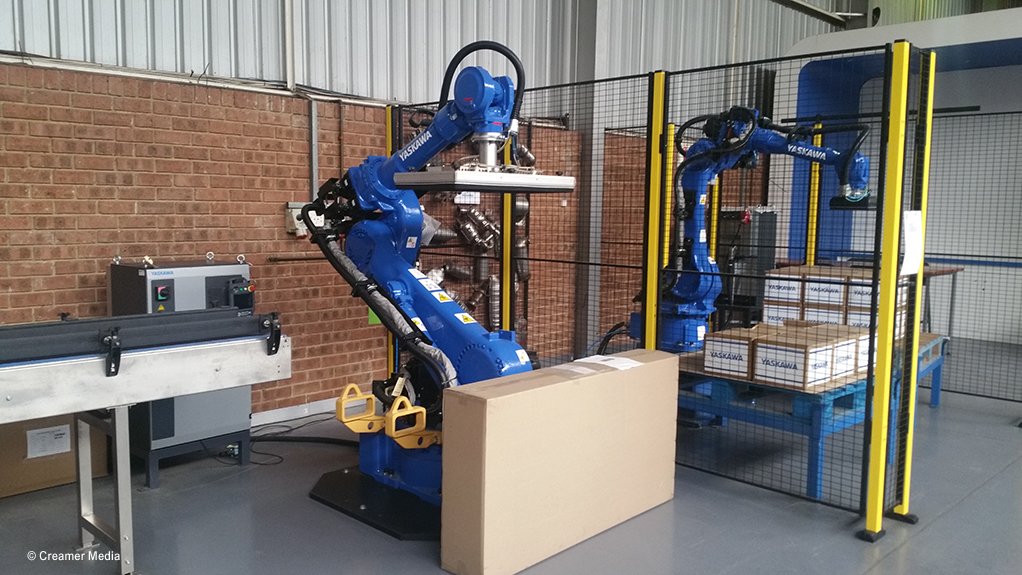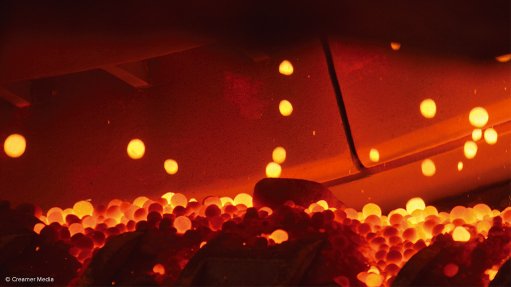Yaskawa diversifying markets as demand for welding, materials handling, logistics robots picks up
Industrial robotics multinational Yaskawa is using its foundational market in the automotive industry in South Africa to drive a diversification in its markets, with demand for general industrial welding robots emerging as a significant trend alongside demand for palletising robots from fast-moving consumer goods, fertiliser and cement plants, says Yaskawa Southern Africa MD Andrew Crackett.
The company is also seeing growing demand from the logistics side of the market.
"A focus for us is to win some of the business in the logistics sector. We had a good year in 2021 and we are having our best year so far, which we aim to continue to drive," he notes.
Yaskawa also aims to diversify its markets throughout the Europe, Middle East and Africa region and, in Europe, the company has seen an accelerated migration to and adoption of robotics outside of the automotive, electronics and metals industries, with the company seeing more installations of food and consumer goods and materials handling robots, as well as for palletising and warehouse automation projects, says Yaskawa Europe Robotics division president Marcus Mead.
"The growth in demand for robots in these industries is partly owing to the inherent and growing complexity of these industries," he adds.
Further, the company's forward looking view for robotics is exciting, as new designs are leveraging digitalisation and data to make the use of robots more decentralised and autonomous.
The use of digital twins and various data management systems allows for more agile and collaborative robots and automation solutions to be deployed. Yaskawa's production and expertise of controller components also helps to position it to play a key role in driving greater autonomy and flexibility in the use of robots, says Mead.
"Traditional process-based robots tend to be restricted to repetitive activities. With the digitalisation of industries, we can bring in more adaptability to local environmental changes, such as robots used in a handling application that can handle different products. Robots' vision and recognition systems enable them to recognise the product and place in the correct position autonomously," he points out.
Yaskawa's PackMaster robot can do this and can help to drive automation and autonomous operations, as it can identify, position and create a well-structured mixed case and help to reduce damage and losses, adds Crackett.
The local company is leveraging the expertise and experience of the Yaskawa Nordic team in the installation and use of the PackMaster robots to aid local clients, he says.
Further, the growing demand for robots presents an exciting opportunity for the company, as it represents huge new markets in addition to its more traditional market, says Mead.
The use of artificial intelligence and machine learning systems enables the traditional limitations of robots to be broken down, enabling more customisation and intuitive management of robots, he adds.
Further, this dovetails with a move to developing collaborative robots that can work alongside people to retain human intelligence and initiative, while enabling simultaneous productivity gains to be made, he says.
The rate of use of robots in startups in Europe, currently, is high and outside of high-end automation. For example, there are robots being used in cake decoration and customised food and product sorting, as well as being used to personalise products automatically for clients.
"However, we have to look at this growth realistically. While there is no doubt that robotics technologies will be used in industrial and non-industrial applications, a vast proportion of robots – about 75% of the installed based – are being used in China, Japan, Korea and Singapore," Mead emphasises.
"The potential opportunities for robotics are significant, but we expect 5% to 10% growth in our installed base, which is not massive growth. Conversely, since 2015, the amount of robots we installed a year has doubled, and points to the potential of markets in the rest of the world outside the East Asia region," he highlights.
Meanwhile, countries with high levels of robotisation tend to be economically more successful than those with lower levels of robotisation, says Yaskawa Europe president and CEO Bruno Schnekenburger.
"If companies want to remain successful, automation can help them to be more efficient, including in terms of the use of energy resources and materials, as they will be able to produce more consistently and at a higher quality with less waste.
"If a company is not competitive, it cannot create jobs. High levels of robotisation help to drive competitiveness and drive a growth in jobs as a sector expands," he says.
A good example of this is the South African automotive industry, concurs Crackett.
A local manufacturing division of an international car manufacturer had produced only 300 cars a week and had 500 employees several decades ago. The plant invested in automation and now produces 3 500 cars a week and has 4 000 employees, while many more jobs have been created in their first and second tier suppliers and service providers as the company grew, he highlights.
"Countries must invest in automation to maintain competitive and successful economies," says Schnekenburger.
"South Africa has the natural resources present in the country and, by using modern manufacturing techniques that use less energy and materials, can produce high quality products while reducing waste. Efficiency gains will translate into sustainability and longevity of the industries, hence employment and economic value," he adds.
Article Enquiry
Email Article
Save Article
Feedback
To advertise email advertising@creamermedia.co.za or click here
Press Office
Announcements
What's On
Subscribe to improve your user experience...
Option 1 (equivalent of R125 a month):
Receive a weekly copy of Creamer Media's Engineering News & Mining Weekly magazine
(print copy for those in South Africa and e-magazine for those outside of South Africa)
Receive daily email newsletters
Access to full search results
Access archive of magazine back copies
Access to Projects in Progress
Access to ONE Research Report of your choice in PDF format
Option 2 (equivalent of R375 a month):
All benefits from Option 1
PLUS
Access to Creamer Media's Research Channel Africa for ALL Research Reports, in PDF format, on various industrial and mining sectors
including Electricity; Water; Energy Transition; Hydrogen; Roads, Rail and Ports; Coal; Gold; Platinum; Battery Metals; etc.
Already a subscriber?
Forgotten your password?
Receive weekly copy of Creamer Media's Engineering News & Mining Weekly magazine (print copy for those in South Africa and e-magazine for those outside of South Africa)
➕
Recieve daily email newsletters
➕
Access to full search results
➕
Access archive of magazine back copies
➕
Access to Projects in Progress
➕
Access to ONE Research Report of your choice in PDF format
RESEARCH CHANNEL AFRICA
R4500 (equivalent of R375 a month)
SUBSCRIBEAll benefits from Option 1
➕
Access to Creamer Media's Research Channel Africa for ALL Research Reports on various industrial and mining sectors, in PDF format, including on:
Electricity
➕
Water
➕
Energy Transition
➕
Hydrogen
➕
Roads, Rail and Ports
➕
Coal
➕
Gold
➕
Platinum
➕
Battery Metals
➕
etc.
Receive all benefits from Option 1 or Option 2 delivered to numerous people at your company
➕
Multiple User names and Passwords for simultaneous log-ins
➕
Intranet integration access to all in your organisation



















